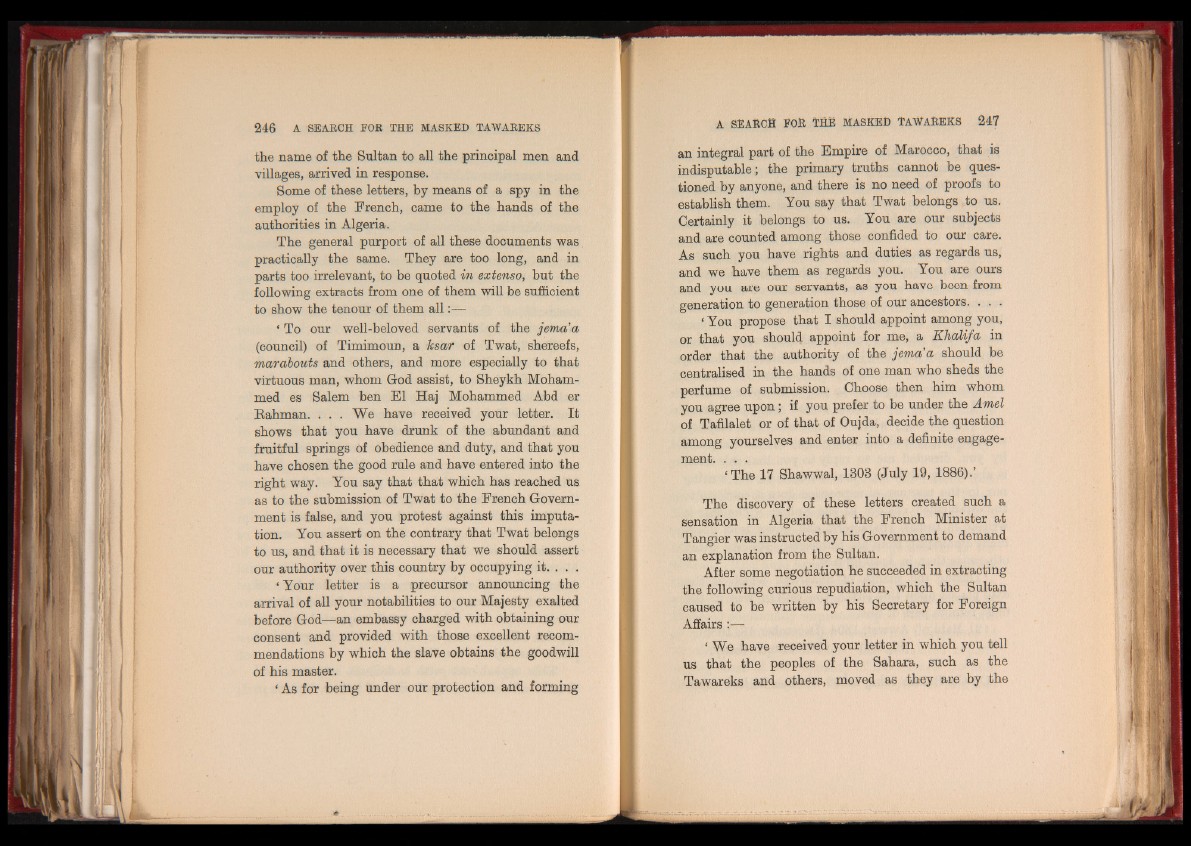
the name of the Sultan to all the principal men and
villages, arrived in response.
Some of these letters, by means of a spy in the
employ of the French, came to the hands of the
authorities in Algeria.
The general purport of all these documents was
practically the same. They are too long, and in
parts too irrelevant, to be quoted in extenso, but the
following extracts from one of them will be sufficient
to show the tenour of them a ll:—
‘ To our well-beloved servants of the jema’a
(council) of Timimoun, a ksar of Twat, shereefs,
marabouts and others, and more especially to that
virtuous man, whom God assist, to Sheykh Mohammed
es Salem ben El Haj Mohammed Abd er
Bahman. , . . We have received your letter. It
shows that you have drunk of the abundant and
fruitful springs of obedience and duty, and that you
have chosen the good rule and have entered into the
right way. You say that that which has reached us
as to the submission of Twat to the French Government
is false, and you protest against this imputation.
You assert on the contrary that Twat belongs
to us, and that it is necessary that we should assert
our authority over this country by occupying it. . . .
* Your letter is a precursor announcing the
arrival of all your notabilities to our Majesty exalted
before God—an embassy charged with obtaining our
consent and provided with those excellent recommendations
by which the slave obtains the goodwill
of his master.
‘ As for being under our protection and forming
an integral part of the Empire of Marocco, that is
indisputable; the primary truths cannot be questioned
by anyone, and there is no need of proofs to
establish them. You say that Twat belongs to us.
Certainly it belongs to us. You are our subjects
and are counted among those confided to our care.
As such you have rights and duties as regards us,
and we have them as regards you. You are ours
and you are our servants, as you have been from
generation to generation those of our ancestors. . . .
{You propose that I should appoint among you,
or that you should appoint for me, a Khalifa in
order that the authority of the jema'a should be
centralised in the hands of one man who sheds the
perfume of submission. Choose then him whom
you agree upon; if you prefer to he under the Amel
of Tafilalet or of that of Oujda, decide the question
among yourselves and enter into a definite engagement.
. . .
‘The 17 Shawwal, 1303 (July 19, 1886).’
The discovery of these letters created such a
sensation in Algeria that the French Minister at
Tangier was instructed by his Government to demand
an explanation from the Sultan.
After some negotiation he succeeded in extracting
the following curious repudiation, which the Sultan
caused to be written by his Secretary for Foreign
Affairs :—
‘ We have received your letter in which you tell
us that the peoples of the Sahara, such as the
Tawareks and others, moved as they are by the